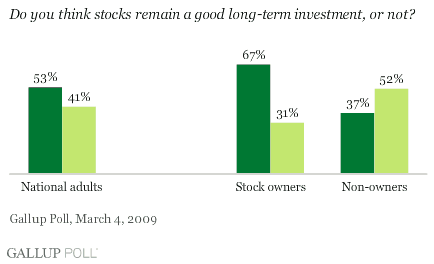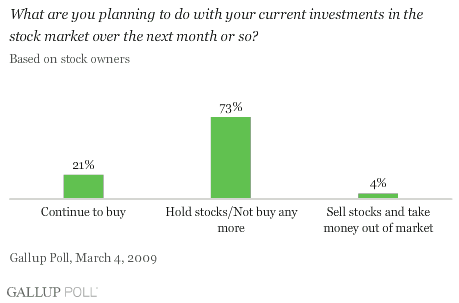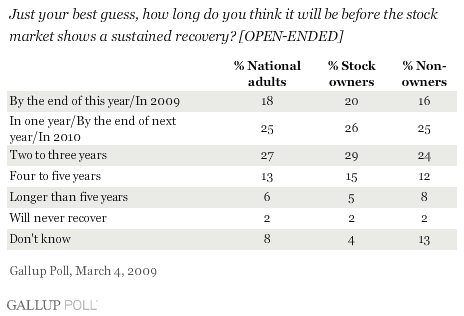WASHINGTON, D.C. -- As the Dow Jones Industrial Average plunged below 7,000 this week, President Barack Obama reacted by saying, "buying stocks is a potentially good deal if you've got a long-term perspective on it." A new ���۴�ýPoll conducted Wednesday night -- after the first gains in six days -- found that 53% of Americans and 67% of stock owners agree that stocks remain a good long-term investment.

Although majorities of both groups endorse investing in the market in theory, views on actually buying stocks in the current economic environment are an entirely different story. When respondents who identified themselves as stock owners (about 6 in 10 Americans) were asked what actions they plan to take "over the next month or so" in regard to their investments, just 21% said they plan to buy more stocks. An overwhelming 73% said they plan to hold their stocks but not buy any more in the near term. Just 4% said they plan to sell stocks and take money out of the market in the next month.

The distinction between short-term decision-making and longer-term prospects likely hinges on how long Americans think it will take for the stock market to recover. When Americans are asked in an open-ended fashion how long they think it will be before the stock market shows "a sustained recovery," 43% suggest it will happen before the end of 2010, while another 27% suggest it will take two to three years. That leaves more than one in five Americans predicting that it won't recover for at least four years. In this case, stock owners do not differ much from national adults overall in their views.

Bottom Line
Despite a tumbling market that concerns even the likes of Warren Buffett, a majority of Americans have faith in the long-term viability of the stock market. More than half believe stocks remain a good long-term investment, including more than two-thirds of stock owners. But risking near-term cash for long-term gains is something few are actually willing to do in the current environment. The fact that the vast majority of stock owners do not plan to buy more stocks over the next month or so suggests that it will take more than what some would consider bargain-basement prices to lure investors back into the market.
Survey Methods
Results are based on telephone interviews with 1,003 national adults, aged 18 and older, conducted March 4, 2009. For results based on the total sample of national adults, one can say with 95% confidence that the maximum margin of sampling error is ±3 percentage points.
For results based on the 617 stock owners, the maximum margin of sampling error is ±4 percentage points.
Interviews are conducted with respondents on land-line telephones (for respondents with a land-line telephone) and cellular phones (for respondents who are cell-phone only).
In addition to sampling error, question wording and practical difficulties in conducting surveys can introduce error or bias into the findings of public opinion polls.
Polls conducted entirely in one day, such as this one, are subject to additional error or bias not found in polls conducted over several days.
